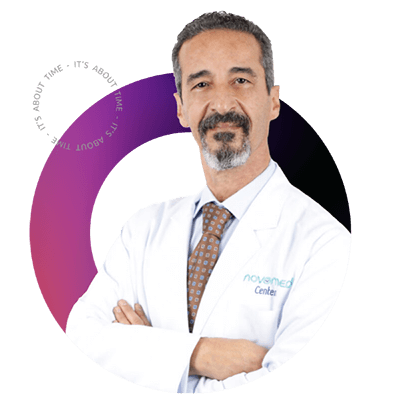Colon polyps are small lumps of cells that develop on the lining of the colon. Most colon polyps are harmless. But over time, most colon polyps can develop into colon cancer, which is always fatal when diagnosed in the late stages.
There are two main types of polyps, neoplastic and non-neoplastic. Non-neoplastic polyps include hyperplastic, inflammatory, and hamartomatous polyps. These types of colon polyps do not usually become cancerous. Neoplastic polyps include both adenomas and serrated types.
Anyone can develop colon polyps. However, the risk increases if you are 50 or older, are overweight, smoke, or have a personal or family history of colon cancer or colon polyps.
Colon polyps usually do not cause any symptoms. It is important to undergo regular screening tests, such as a colonoscopy, because colon polyps detected at an early stage can be removed completely and safely.
Symptoms
Colon polyps may cause no symptoms. You may not know you have a colon polyp until your doctor detects it during a stool test.
However, the following symptoms may be experienced by people with colon polyps:
- Rectal bleeding. This can occur as a result of colon polyps, colon cancer, or other conditions, such as hemorrhoids or secondary tears in the anus.
- Change in stool color. Blood may appear as red streaks in the stool and may make the stool blackish. The color change may also be caused by foods, medications, and supplements.
- Change in bowel habits. Constipation or diarrhea that has lasted longer than a week may indicate a large colon polyp. But a host of other conditions may also cause changes in bowel habits.
- Pain. A large colon polyp may partially block the intestine, causing abdominal pain because of cramps.
- Anemia caused by iron deficiency Polyps may bleed slowly over time, without the presence of blood in the stool. Chronic bleeding causes the body to empty the iron needed to produce hemoglobin that allows red blood cells to transport oxygen to the body. This leads to anemia, which makes you feel tired and have difficulty breathing.
Causes
Healthy cells grow and divide in an organized manner. However, mutations in certain genes can cause cell division to continue even when new cells are not needed. This irregular growth can cause polyps to form in the colon and rectum. Polyps may develop anywhere in the large intestine.
Although the polyps themselves do not pose a major threat, having ulcerative colitis or Crohn’s disease in the colon increases the risk of colon cancer in general.
Neoplastic polyps include both adenomas and serrated types. Most colon polyps are adenomas. Serrated polyps may become cancerous, depending on their size and location in the colon. The larger the polyp, the greater the risk of cancer.
Diagnosis
Screening tests play an important role in detecting polyps before they become cancerous. These tests help find rectal and colon cancer in its early stages and give you a good chance of recovery.
Screening methods include the following:
- Colonoscopy, which is one of the most sensitive tests for colon and rectal polyps and cancer. If polyps are found, the doctor may remove them immediately or take tissue samples (biopsies) for analysis.
- Virtual colonoscopy, which is a simple test in which a CT scan is used to view the colon. Virtual colonoscopy requires the same bowel preparation process as colonoscopy. If a polyp is found, you will need a colonoscopy to remove it.
- Flexible sigmoidoscopy, in which a thin, lighted tube is inserted into the rectum to examine the last third part of the colon and rectum. If a polyp is found, you will need a colonoscopy to remove it.
- Stool test. This test is performed to check for blood in the stool or assess the stool DNA. If the stool test is positive, you will need a colonoscopy.
Treatment
Your doctor will likely remove all polyps discovered during an intestinal examination. Removal options include the following:
- Forceps or a wire loop (polypectomy) removal. If the polyp is larger than 1 centimeter, a fluid may be injected to raise the polyp and isolate it from the surrounding tissue so that it can be removed.
- Minimally invasive surgery. Laparoscopic surgery can be performed if the polyps are too large or cannot be removed safely by inserting an instrument called a laparoscope into the intestine.
- Colon and rectal removal. If you have a rare inherited syndrome, such as familial adenomatous polyposis (FAP), you may need surgery to remove the colon and rectum (total colectomy).
To book an appointment or for more information about colon polyps diagnosis and treatment, call us toll-free on 800 (NOVO) 6686 or click the live chat icon at the bottom of the screen.


























